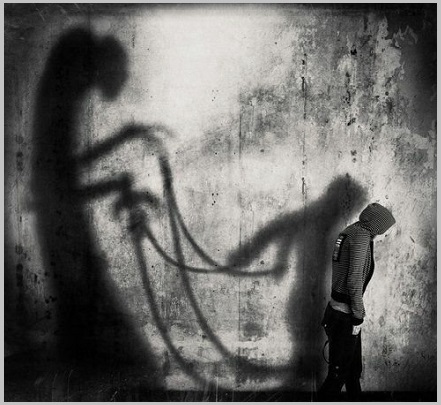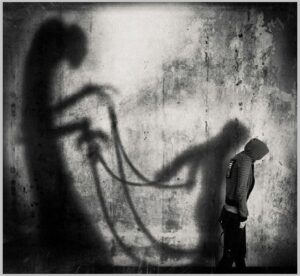Spiritual Obsession: Causes, Types, and Paths to Liberation
Spiritual obsession has been carefully studied in Spiritism since the works of Allan Kardec. It refers to the persistent influence of Spirits over incarnate or discarnate individuals, often causing emotional, physical, and spiritual imbalances.
Far from being an abstract concept, obsession is a real experience that silently affects thousands of people. In many cases, it is mistaken for emotional disorders or relationship conflicts. This article explores the meaning, types, signs, and, most importantly, the spiritual paths to clarification and freedom.

What Is Spiritual Obsession?
According to Allan Kardec in The Mediums’ Book and Genesis, spiritual obsession is the persistent action of a Spirit upon another person, incarnate or discarnate. This influence may range from simple mental suggestions to a direct dominance over someone’s will.
Obsession Is Not Possession
Unlike popular culture or movies may suggest, there is no such thing as “possession of the body.” Instead, it is a continuous mental interference that may lead to confusion, anxiety, compulsive behaviors, and even psychosomatic illnesses.
Why Does It Happen?
- Negative spiritual affinity: Spirits are drawn to similar thoughts, emotions, or addictions.
- Past-life bonds: Old enmities or unresolved guilt may cause reencounters for revenge or adjustment.
- Moral and emotional vulnerability: Pride, anger, selfishness, and addictions make people more exposed.
Types of Spiritual Obsession
Kardec identified three main levels of obsession, depending on intensity:
a) Simple Obsession – The Spirit induces repetitive thoughts or minor disturbances. The person is aware but struggles to free themselves.
b) Fascination – The victim loses discernment, as the Spirit flatters, deceives, and manipulates, often leading to arrogance, isolation, and mistakes.
c) Subjugation (Moral or Physical) – The strongest form, where the Spirit dominates the will, causing compulsive acts, severe emotional disorders, or even physical manifestations.
Signs and Symptoms of Spiritual Obsession
Although each case is unique, common signs include:
- Unexplained sadness or irritability
- Persistent intrusive thoughts
- Feeling of a “constant presence” or energetic exhaustion
- Sudden mood swings
- Resistance to prayer or spiritual study
- Disturbing dreams or frequent nightmares
It is crucial to note that not every emotional imbalance has a spiritual cause. Spiritism always recommends careful observation alongside medical and psychological support.
Spiritist Approach to Treating Obsession
Liberation does not come from magic rituals, but from sincere effort and spiritual support. Key guidelines include:
- Inner reform & moral strength: Improving thoughts, cultivating forgiveness, and practicing charity raise personal vibrations.
- Prayer and mental vigilance: Honest prayer connects with higher Spirits, while self-control weakens negative influence.
- Participation in Spiritist meetings: Serious gatherings provide spiritual assistance and enlightenment for both sides.
- Clarification of the obsessor: Obsessing Spirits are not “demons” but suffering brothers. Through dialogue, they can let go of vengeance.
The Role of Mediumship
Sensitive mediums may detect obsessors or assist in dialogues with them. Safe mediumship, guided by study and ethics, is essential to avoid illusions and dangers.
Obsession and Mental Health: Key Differences
Not all anxiety, depression, or behavioral issues are spiritual. Spiritism advises never abandoning medical and psychological care. Spiritual and material treatments often complement each other.
Kardec’s Real Cases
In The Mediums’ Book, Kardec reports several examples where revengeful Spirits influenced incarnates. In every case, improvement came not through “fighting” the Spirit but through moral growth and the Spirit’s enlightenment.
How to Prevent Spiritual Obsession
- Keep positive thoughts and emotions
- Avoid addictions that open spiritual vulnerabilities
- Study the Gospel and Spiritist works
- Practice charity and forgiveness daily
- Cultivate humility and self-awareness
Conclusion: Obsession as a Path to Growth
Spiritual obsession should not be seen as punishment but as an opportunity for moral renewal. With faith, discipline, and courage, it becomes a stepping stone toward spiritual liberation — for both the person and the Spirit.
“Watch and pray, so that you will not fall into temptation.” — Jesus (Matthew 26:41)
FAQ
- Is everyone affected by obsession a medium?
Not necessarily. While mediums are more sensitive, anyone can be influenced. - Can I overcome obsession alone?
Prayer and self-improvement help, but Spiritist centers often provide essential support. - What’s the difference between obsession and mediumship?
Mediumship is a natural ability. Obsession is a negative influence, with or without mediumship. - Are obsessors always evil?
Not always. Many are simply suffering Spirits connected by old resentments. - Does Kardec mention quick cures?
No. He emphasizes that healing requires personal moral effort and the Spirit’s understanding.
Share this content:













Post Comment